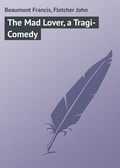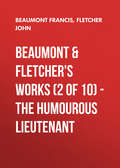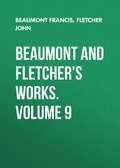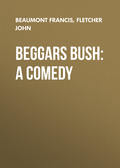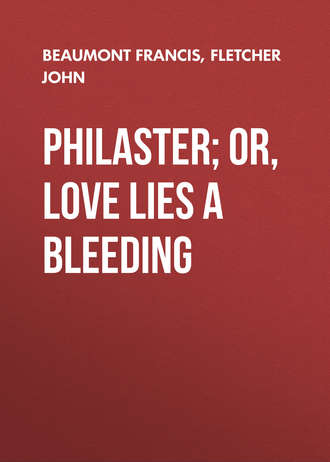
Beaumont Francis
Philaster; Or, Love Lies a Bleeding
Actus Quartus. Scena Prima
Enter King, Pharamond, Arethusa, Galatea, Megra,
Dion, Cleremont, Thrasilin, and Attendants.
K. What, are the Hounds before, and all the woodmen?
Our horses ready, and our bows bent?
Di. All Sir.
King. Y'are cloudy Sir, come we have forgotten
Your venial trespass, let not that sit heavy
Upon your spirit; none dare utter it.
Di. He looks like an old surfeited Stallion after his leaping,
dull as a Dormouse: see how he sinks; the wench has shot
him between wind and water, and I hope sprung a leak.
Thra. He needs no teaching, he strikes sure enough; his
greatest fault is, he Hunts too much in the Purlues,
would he would leave off Poaching.
Di. And for his horn, has left it at the Lodge where he lay late; Oh, he's a precious Lime-hound; turn him loose upon the pursuit of a Lady, and if he lose her, hang him up i'th' slip. When my Fox-bitch Beauty grows proud, I'le borrow him.
King. Is your Boy turn'd away?
Are. You did command Sir, and I obey you.
King. 'Tis well done: Hark ye further.
Cle. Is't possible this fellow should repent? Me thinks that were not noble in him: and yet he looks like a mortified member, as if he had a sick mans Salve in's mouth. If a worse man had done this fault now, some Physical Justice or other, would presently (without the help of an Almanack) have opened the obstructions of his Liver, and let him bloud with a Dog-whip.
Di. See, see, how modestly your Lady looks, as if she came
from Churching with her Neighbour; why, what a Devil
can a man see in her face, but that she's honest?
Pha. Troth no great matter to speak of, a foolish twinkling
with the eye, that spoils her Coat; but he must be a
cunning Herald that finds it.
Di. See how they Muster one another! O there's a Rank Regiment where the Devil carries the Colours, and his Dam Drum major, now the world and the flesh come behind with the Carriage.
Cle. Sure this Lady has a good turn done her against her will: before she was common talk, now none dare say, Cantharides can stir her, her face looks like a Warrant, willing and commanding all Tongues, as they will answer it, to be tied up and bolted when this Lady means to let her self loose. As I live she has got her a goodly protection, and a gracious; and may use her body discreetly, for her healths sake, once a week, excepting Lent and Dog-days: Oh if they were to be got for mony, what a great sum would come out of the City for these Licences?
King. To horse, to horse, we lose the morning, Gentlemen.
[Exeunt.
Enter two Woodmen.
1 Wood.What, have you lodged the Deer?
2 Wood. Yes, they are ready for the Bow.
1 Wood. Who shoots?
2 Wood. The Princess.
1 Wood. No she'l Hunt.
2 Wood. She'l take a Stand I say.
1 Wood. Who else?
2 Wood. Why the young stranger Prince.
1 Wood. He shall Shoot in a Stone-bow for me. I never lov'd his beyond-sea-ship, since he forsook the Say, for paying Ten shillings: he was there at the fall of a Deer, and would needs (out of his mightiness) give Ten groats for the Dowcers; marry the Steward would have had the Velvet-head into the bargain, to Turf his Hat withal: I think he should love Venery, he is an old Sir Tristram; for if you be remembred, he forsook the Stagg once, to strike a Rascal Milking in a Medow, and her he kill'd in the eye. Who shoots else?
2 Wood. The Lady Galatea.
1 Wood. That's a good wench, and she would not chide us for tumbling of her women in the Brakes. She's liberal, and by my Bow they say she's honest, and whether that be a fault, I have nothing to do. There's all?
2 Wood. No, one more, Megra.
1 Wood. That's a firker I'faith boy; there's a wench will Ride her Haunces as hard after a Kennel of Hounds, as a Hunting-saddle; and when she comes home, get 'em clapt, and all is well again. I have known her lose her self three times in one Afternoon (if the Woods had been answerable) and it has been work enough for one man to find her, and he has sweat for it. She Rides well, and she payes well. Hark, let's go.
[Exeunt.
Enter Philaster.
Phi. Oh, that I had been nourished in these woods
With Milk of Goats, and Acorns, and not known
The right of Crowns, nor the dissembling Trains
Of Womens looks; but dig'd my self a Cave,
Where I, my Fire, my Cattel, and my Bed
Might have been shut together in one shed;
And then had taken me some Mountain Girl,
Beaten with Winds, chast as the hardened Rocks
Whereon she dwells; that might have strewed my Bed
With leaves, and Reeds, and with the Skins of beasts
Our Neighbours; and have born at her big breasts
My large course issue. This had been a life free
from vexation.
[ Enter Bellario.
Bell. Oh wicked men!
An innocent man may walk safe among beasts,
Nothing assaults me here. See, my griev'd Lord
Sits as his soul were searching out a way,
To leave his body. Pardon me that must
Break thy last commandment; For I must speak;
You that are griev'd can pity; hear my Lord.
Phi. Is there a Creature yet so miserable,
That I can pity?
Bell. Oh my Noble Lord,
View my strange fortune, and bestow on me,
According to your bounty (if my service
Can merit nothing) so much as may serve
To keep that little piece I hold of life
From cold and hunger.
Phi. Is it thou? be gone:
Go sell those misbeseeming Cloaths thou wear'st,
And feed thy self with them.
Bell. Alas! my Lord, I can get nothing for them:
The silly Country people think 'tis Treason
To touch such gay things.
Phi. Now by my life this is
Unkindly done, to vex me with thy sight,
Th'art fain again to thy dissembling trade:
How should'st thou think to cozen me again?
Remains there yet a plague untri'd for me?
Even so thou wept'st and spok'st when first
I took thee up; curse on the time. If thy
Commanding tears can work on any other,
Use thy art, I'le not betray it. Which way
Wilt thou take, that I may shun thee;
For thine eyes are poyson to mine; and I
Am loth to grow in rage. This way, or that way?
Bell. Any will serve. But I will chuse to have
That path in chase that leads unto my grave.
[Exeunt Phil. and Bell. severally.
Enter Dion and the Woodmen.
Di. This is the strangest sudden change! You Woodman.
1 Wood. My Lord Dion.
Di. Saw you a Lady come this way on a Sable-horse stubbed with stars of white?
2 Wood. Was she not young and tall?
Di. Yes; Rode she to the wood, or to the plain?
2 Wood. Faith my Lord we saw none.
[Exeunt Wood.
Enter Cleremont.
Di. Pox of your questions then. What, is she found?
Cle. Nor will be I think.
Di. Let him seek his Daughter himself; she cannot stray about a little necessary natural business, but the whole Court must be in Arms; when she has done, we shall have peace.
Cle. There's already a thousand fatherless tales amongst us; some say her Horse run away with her; some a Wolf pursued her; others, it was a plot to kill her; and that Armed men were seen in the Wood: but questionless, she rode away willingly.
Enter King, and Thrasiline.
King. Where is she?
Cle. Sir, I cannot tell.
King. How is that? Answer me so again.
Cle. Sir, shall I lie?
King. Yes, lie and damn, rather than tell me that; I say again, where is she? Mutter not; Sir, speak you where is she?
Di. Sir, I do not know.
King. Speak that again so boldly, and by Heaven
It is thy last. You fellows answer me,
Where is she? Mark me all, I am your King.
I wish to see my Daughter, shew her me;
I do command you all, as you are subjects,
To shew her me, what am I not your King?
If I, then am I not to be obeyed?
Di. Yes, if you command things possible and honest.
King. Things possible and honest! Hear me, thou,
Thou Traytor, that darest confine thy King to things
Possible and honest; shew her me,
Or let me perish, if I cover not all Cicily with bloud.
Di. Indeed I cannot, unless you tell me where she is.
King. You have betray'd me, y'have, let me lose
The Jewel of my life, go; bring her me,
And set her before me; 'tis the King
Will have it so, whose breath can still the winds,
Uncloud the Sun, charm down the swelling Sea,
And stop the Flouds of Heaven; speak, can it not?
Di. No.
King. No, cannot the breath of Kings do this?
Di. No; nor smell sweet it self, if once the Lungs Be but corrupted.
King. Is it so? Take heed.
Di. Sir, take you heed; how you dare the powers
That must be just.
King. Alas! what are we Kings?
Why do you gods place us above the rest;
To be serv'd, flatter'd, and ador'd till we
Believe we hold within our hands your Thunder,
And when we come to try the power we have,
There's not a leaf shakes at our threatnings.
I have sin'd 'tis true, and here stand to be punish'd;
Yet would not thus be punish'd; let me chuse
My way, and lay it on.
Di. He Articles with the gods; would some body would draw bonds, for the performance of Covenants betwixt them.
Enter Pha. Galatea, and Megra.
King. What, is she found?
Pha. No, we have ta'ne her Horse. He gallopt empty by: there's some Treason; You Galatea rode with her into the wood; why left you her?
Gal. She did command me.
King. Command! you should not.
Gal. 'Twould ill become my Fortunes and my Birth
To disobey the Daughter of my King.
King. Y'are all cunning to obey us for our hurt,
But I will have her.
Pha. If I have her not,
By this hand there shall be no more Cicily.
Di. What will he carry it to Spain in's pocket?
Pha. I will not leave one man alive, but the King,
A Cook and a Taylor.
Di. Yet you may do well to spare your Ladies Bed-fellow,
and her you may keep for a Spawner.
King. I see the injuries I have done must be reveng'd.
Di. Sir, this is not the way to find her out.
King. Run all, disperse your selves: the man that finds her, Or (if she be kill'd) the Traytor; I'le [make] him great.
Di. I know some would give five thousand pounds to find her.
Pha. Come let us seek.
King. Each man a several way, here I my self.
Di. Come Gentlemen we here.
Cle. Lady you must go search too.
Meg. I had rather be search'd my self.
[Exeunt omnes.
Enter Arethusa.
Are. Where am I now? Feet find me out a way,
Without the counsel of my troubled head,
I'le follow you boldly about these woods,
O're mountains, thorow brambles, pits, and flouds:
Heaven I hope will ease me. I am sick.
Enter Bellario.
Bell. Yonder's my Lady; Heaven knows I want nothing;
Because I do not wish to live, yet I
Will try her Charity. Oh hear, you that have plenty,
From that flowing store, drop some on dry ground; see,
The lively red is gone to guard her heart;
I fear she faints. Madam look up, she breaths not;
Open once more those rosie twins, and send
Unto my Lord, your latest farewell; Oh, she stirs:
How is it Madam? Speak comfort.
Are. 'Tis not gently done,
To put me in a miserable life,
And hold me there; I pray thee let me go,
I shall do best without thee; I am well.
Enter Philaster.
Phil. I am to blame to be so much in rage,
I'le tell her coolely, when and where I heard
This killing truth. I will be temperate
In speaking, and as just in hearing.
Oh monstrous! Tempt me not ye gods, good gods
Tempt not a frail man, what's he, that has a heart
But he must ease it here?
Bell. My Lord, help the Princess.
Are. I am well, forbear.
Phi. Let me love lightning, let me be embrac'd
And kist by Scorpions, or adore the eyes
Of Basilisks, rather than trust to tongues,
And shrink these veins up; stick me here a stone
Lasting to ages in the memory
Of this damn'd act. Hear me you wicked ones,
You have put the hills on fire into this breast,
Not to be quench'd with tears, for which may guilt
Sit on your bosoms; at your meals, and beds,
Despair await you: what, before my face?
Poyson of Aspes between your lips; Diseases
Be your best issues; Nature make a Curse
And throw it on you.
Are. Dear Philaster, leave
To be enrag'd, and hear me.
Phi. I have done;
Forgive my passion, not the calm'd sea,
When Æolus locks up his windy brood,
Is less disturb'd than I, I'le make you know it.
Dear Arethusa, do but take this sword,
And search how temperate a heart I have;
Then you and this your boy, may live and raign
In lust without control; Wilt thou Bellario?
I prethee kill me; thou art poor, and maist
Nourish ambitious thoughts, when I am dead:
This way were freer; Am I raging now?
If I were mad I should desire to live;
Sirs, feel my pulse; whether have you known
A man in a more equal tune to die?
Bel. Alas my Lord, your pulse keeps madmans time,
So does your tongue.
Phi. You will not kill me then?
Are. Kill you?
Bell. Not for a world.
Phi. I blame not thee,
Bellario; thou hast done but that, which gods
Would have transform'd themselves to do; be gone,
Leave me without reply; this is the last
Of all our meeting. Kill me with this sword;
Be wise, or worse will follow: we are two
Earth cannot bear at once. Resolve to do, or suffer.
Are. If my fortunes be so good to let me fall
Upon thy hand, I shall have peace in death.
Yet tell me this, will there be no slanders,
No jealousies in the other world, no ill there?
Phi. No.
Are. Shew me then the way.
Phi. Then guide
My feeble hand, you that have power to do it,
For I must perform a piece of justice. If your youth
Have any way offended Heaven, let prayers
Short and effectual reconcile you to it.
Are. I am prepared.
Enter a Country-fellow.
Coun. I'le see the King if he be in the Forest, I have hunted him these two hours; if I should come home and not see him my Sisters would laugh at me; I can see nothing but people better horst than my self, that outride me; I can hear nothing but shouting. These Kings had need of good brains, this whooping is able to put a mean man out of his wits. There's a Courtier with his sword drawn, by this hand upon a woman, I think.
Phi. Are you at peace?
Are. With Heavens and Earth.
Phi. May they divide thy soul and body?
Coun. Hold dastard, strike a Woman! th'art a craven I warrant thee, thou wouldst be loth to play half a dozen of venies at wasters with a good fellow for a broken head.
Phi. Leave us good friend.
Are. What ill bred man art thou, to intrude thy self
Upon our private sports, our recreations?
Coun. God 'uds, I understand you not, but I know the
Rogue has hurt you.
Phi. Pursue thy own affairs: it will be ill To multiply bloud upon my head; which thou wilt force me to.
Coun. I know not your Rhetorick, but I can lay it on if you touch the woman.
[They fight.
Phi. Slave, take what thou deservest.
Are. Heavens guard my Lord.
Coun. Oh do you breath?
Phi. I hear the tread of people: I am hurt.
The gods take part against me, could this Boor
Have held me thus else? I must shift for life,
Though I do loath it. I would find a course,
To lose it, rather by my will than force.
[Exit Phil.
Coun. I cannot follow the Rogue. I pray thee wench come and kiss me now.
Enter Phara. Dion, Cle. Thra. and Woodmen.
Pha. What art thou?
Coun. Almost kil'd I am for a foolish woman; a knave
has hurt her.
Pha. The Princess Gentlemen! Where's the wound Madam?
Is it dangerous?
Are. He has not hurt me.
Coun. I'faith she lies, has hurt her in the breast, look else.
Pha. O sacred spring of innocent blood!
Di. 'Tis above wonder! who should dare this?
Are. I felt it not.
Pha. Speak villain, who has hurt the Princess?
Coun. Is it the Princess?
Di. I.
Coun. Then I have seen something yet.
Pha. But who has hurt her?
Coun. I told you a Rogue I ne're saw him before, I.
Pha. Madam who did it?
Are. Some dishonest wretch, Alas I know him not,
And do forgive him.
Coun. He's hurt too, he cannot go far, I made my Fathers old Fox flie about his ears.
Pha. How will you have me kill him?
Are. Not at all, 'tis some distracted fellow.
Pha. By this hand, I'le leave ne'er a piece of him bigger than a Nut, and bring him all in my Hat.
Are. Nay, good Sir;
If you do take him, bring him quick to me,
And I will study for a punishment,
Great as his fault.
Pha. I will.
Are. But swear.
Pha. By all my love I will: Woodmen conduct the Princess to the King, and bear that wounded fellow to dressing: Come Gentlemen, we'l follow the chase close.
[Ex. Are. Pha. Di. Cle. Thra. and 1 Woodman.
Coun. I pray you friend let me see the King.
2 Wood.That you shall, and receive thanks.
[Exeunt.
Coun. If I get clear with this, I'le go see no more gay sights.
Enter Bellario.
Bell. A heaviness near death sits on my brow,
And I must sleep: Bear me thou gentle bank,
For ever if thou wilt: you sweet ones all,
Let me unworthy press you: I could wish
I rather were a Coarse strewed o're with you,
Than quick above you. Dulness shuts mine eyes,
And I am giddy; Oh that I could take
So sound a sleep, that I might never wake.
Enter Philaster.
Phi. I have done ill, my conscience calls me false,
To strike at her, that would not strike at me:
When I did fight, me thought I heard her pray
The gods to guard me. She may be abus'd,
And I a loathed villain: if she be,
She will conceal who hurt her; He has wounds,
And cannot follow, neither knows he me.
Who's this; Bellario sleeping? If thou beest
Guilty, there is no justice that thy sleep
[Cry within.
Should be so sound, and mine, whom thou hast wrong'd,
So broken: Hark I am pursued: you gods
I'le take this offer'd means of my escape:
They have no mark to know me, but my wounds,
If she be true; if false, let mischief light
On all the world at once. Sword, print my wounds
Upon this sleeping boy: I ha' none I think
Are mortal, nor would I lay greater on thee.
[Wounds him.
Bell. Oh death I hope is come, blest be that hand, It meant me well; again, for pities sake.
Phi. I have caught my self,
[Phi. falls.
The loss of bloud hath stayed my flight. Here, here,
Is he that stroke thee: take thy full revenge,
Use me, as I did mean thee, worse than death:
I'le teach thee to revenge this luckless hand
Wounded the Princess, tell my followers
Thou didst receive these hurts in staying me,
And I will second thee: Get a reward.
Bell. Fly, fly my Lord and save your self.
Phi. How's this?
Wouldst thou I should be safe?
Bell. Else it were vain
For me to live. These little wounds I have,
Ha' not bled much, reach me that noble hand,
I'le help to cover you.
Phi. Art thou true to me?
Bell. Or let me perish loath'd. Come my good Lord, Creep in amongst those bushes: who does know But that the gods may save your (much lov'd) breath?
Phi. Then I shall die for grief, if not for this, That I have wounded thee: what wilt thou do?
Bell. Shift for my self well: peace, I hear 'em come.
Within. Follow, follow, follow; that way they went.
Bell. With my own wounds I'le bloudy my own sword. I need not counterfeit to fall; Heaven knows, That I can stand no longer.
Enter Pha. Dion, Cle. and Thra.
Pha. To this place we have tract him by his bloud.
Cle. Yonder, my Lord, creeps one away.
Di. Stay Sir, what are you?
Bell. A wretched creature wounded in these Woods
By Beasts; relieve me, if your names be men,
Or I shall perish.
Di. This is he my Lord,
Upon my soul that hurt her; 'tis the boy,
That wicked boy that serv'd her.
Pha. O thou damn'd in thy creation!
What cause could'st thou shape to hurt the Princess?
Bell. Then I am betrayed.
Di. Betrayed! no, apprehended.
Bell. I confess;
Urge it no more, that big with evil thoughts
I set upon her, and did take my aim
Her death. For charity let fall at once
The punishment you mean, and do not load
This weary flesh with tortures.
Pha. I will know who hir'd thee to this deed?
Bell. Mine own revenge.
Pha. Revenge, for what?
Bell. It pleas'd her to receive
Me as her Page, and when my fortunes ebb'd,
That men strid o're them carelesly, she did showr
Her welcome graces on me, and did swell
My fortunes, till they overflow'd their banks,
Threatning the men that crost 'em; when as swift
As storms arise at sea, she turn'd her eyes
To burning Suns upon me, and did dry
The streams she had bestowed, leaving me worse
And more contemn'd than other little brooks,
Because I had been great: In short, I knew
I could not live, and therefore did desire
To die reveng'd.
Pha. If tortures can be found,
Long as thy natural life, resolve to feel
The utmost rigour.
[Philaster creeps out of a bush.
Cle. Help to lead him hence.
Phi. Turn back you ravishers of Innocence, Know ye the price of that you bear away so rudely?
Pha. Who's that?
Di. 'Tis the Lord Philaster.
Phi. 'Tis not the treasure of all Kings in one,
The wealth of Tagus, nor the Rocks of Pearl,
That pave the Court of Neptune, can weigh down
That vertue. It was I that hurt the Princess.
Place me, some god, upon a Piramis,
Higher than hills of earth, and lend a voice
Loud as your Thunder to me, that from thence,
I may discourse to all the under-world,
The worth that dwells in him.
Pha. How's this?
Bell. My Lord, some man Weary of life, that would be glad to die.
Phi. Leave these untimely courtesies Bellario.
Bell. Alas he's mad, come will you lead me on?
Phi. By all the Oaths that men ought most to keep:
And Gods do punish most, when men do break,
He toucht her not. Take heed Bellario,
How thou dost drown the vertues thou hast shown
With perjury. By all that's good 'twas I:
You know she stood betwixt me and my right.
Pha. Thy own tongue be thy judge.
Cle. It was Philaster.
Di. Is't not a brave boy? Well Sirs, I fear we were all deceived.
Phi. Have I no friend here?
Di. Yes.
Phi. Then shew it;
Some good body lend a hand to draw us nearer.
Would you have tears shed for you when you die?
Then lay me gentle on his neck that there
I may weep flouds, and breath out my spirit:
'Tis not the wealth of Plutus, nor the gold
Lockt in the heart of earth, can buy away
This arm-full from me, this had been a ransom
To have redeem'd the great Augustus Caesar,
Had he been taken: you hard-hearted men,
More stony than these Mountains, can you see
Such clear pure bloud drop, and not cut your flesh
To stop his life? To bind whose better wounds,
Queens ought to tear their hair, and with their tears,
Bath 'em. Forgive me, thou that art the wealth of
poor Philaster.
[Enter King, Arethusa and a Guard.
King. Is the villain ta'ne?
Pha. Sir, here be two confess the deed; but say it was Philaster.
Phi. Question it no more, it was.
King. The fellow that did fight with him will tell us.
Are. Ay me, I know he will.
King. Did not you know him?
Are. Sir, if it was he, he was disguised.
Phi. I was so. Oh my stars! that I should live still.
King. Thou ambitious fool; Thou that hast laid a train for thy own life; Now I do mean to do, I'le leave to talk, bear him to prison.
Are. Sir, they did plot together to take hence
This harmless life; should it pass unreveng'd,
I should to earth go weeping: grant me then
(By all the love a Father bears his Child)
Their custodies, and that I may appoint
Their tortures and their death.
Di. Death? soft, our Law will not reach that, for this fault.
King. 'Tis granted, take 'em to you, with a Guard. Come Princely Pharamond, this business past, We may with more security go on to your intended match.
Cle. I pray that this action lose not Philaster the hearts of the people.
Di. Fear it not, their overwise heads will think it but a trick.



